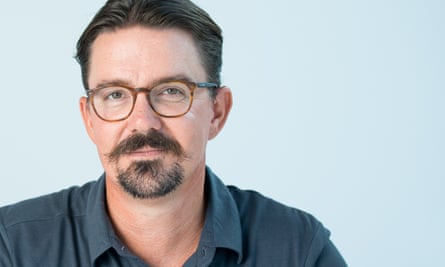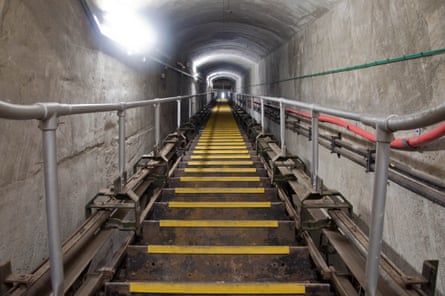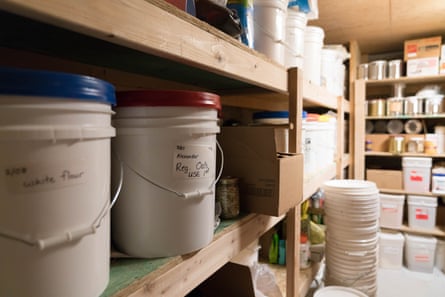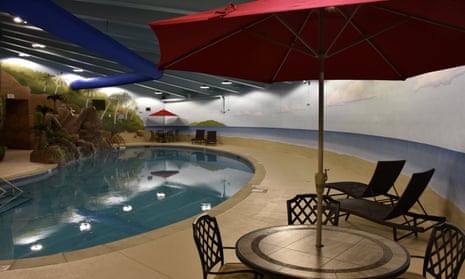“Nothing sets your priorities straight better than a disaster,” says Bradley Garrett. “Making sure your basics are covered, making sure your loved ones are cared for. These are the things that matter. Going back to survival mode is a good thing … We’re going to be in lockdown for some months. But although the worst-case scenarios are terrifying, we will survive as a species. And we will learn.” A California geographer and urban explorer, Garrett has spent the past four years researching his book Bunker: Preparing for the End Times, which will be published in August. The research has involved hanging out with millenarian fruitcakes, disaster profiteers and the uber-rich, not to mention tooled-up, swivel-eyed anarcho-libertarians from America to Australia.
Garrett became known in 2012 for climbing the Shard before it opened. As part of his ethnographical research into hidden aspects of cities he joined a group of trespassers called London Consolidation Crew. In 2014, he pleaded guilty to committing criminal damage during sorties into disused London Underground tunnels and published Explore Everything: Place-Hacking the City.
The catalyst for his new book lies below Wiltshire. As part of his place-hacking adventures, Garrett had visited the Central Government War Headquarters, a 35-acre cold war bunker just outside Bath. The complex, called Burlington Bunker, under RAF Corsham, includes 60 miles of roads, 100,000 lights, sleeping quarters, a bomb-proof radio station, laundries, a drinking water reservoir, and a library from which Garrett nicked a few empty notebooks. “I kept the notebooks with me, waiting for a story worthy of them. I finally saw my chance in 2016, when the secret city was listed for sale, put on the market for £1.5m.” One of the prospective buyers was Robert Vicino, whom Garrett calls a doomsday realtor, and who markets bunkers to survive whatever apocalypse you might dread. “What these guys are selling is time,” Garrett says. “Yes, they’re selling space, but that’s the wrapper. The time to hunker down is really what’s on offer.”

Garrett met other dread merchants, including Larry Hall, a businessman who bought a 60-metre cold-war silo, designed to house nuclear-tipped intercontinental ballistic missiles, for $300,000 in 2008. Hall transformed this Kansas facility into a 15-storey inverted skyscraper called Survival Condo, where up to 75 individuals can weather a maximum of five years inside. Half-floor apartments cost $1.5m, full-floor apartments $3m, while a 335-square-metre two-storey penthouse has sold for $4.5m. One resident made a year-long video film of the view from her Manhattan loft apartment over Central Park, during all four seasons, day and night, together with the cacophonous sounds of urban life. That film is now projected on to a wall of the silo, along with a mock-up of her balcony. The result? A Baudrillardian simulacrum to soothe her through five years in lockdown, while above ground presumably resembles a scene from The Walking Dead.
In Bunker, Garrett discusses Navajo and Hopi cosmology, which posits that the era we live in now – the “Fourth World” – is likely to end as a result of human hubris. “Those Native Americans were on to something,” he says. But his sense is that disaster gives us an opportunity to rethink how we live. What will we learn? “That so much of what we do is bullshit. Work life destroys the planet because of travelling everywhere.” I suggest that he sounds like the anarchist anthropologist David Graeber, whose 2013 article “On the Phenomenon of Bullshit Jobs” suggested many people spend their entire working lives performing tasks they believe to be unnecessary. “He’s right! I’ve got three plane tickets I’ve destroyed because I can’t travel. It’s so nice, really, not to go to the conferences. It’s great to recalibrate.”

We’re doing this interview over Skype – me in London lockdown, he at his 78-year-old mother’s house in the hills above Los Angeles: he’s looking after her while she convalesces from surgery. “It’s in a gated community, which for a long time I’ve thought typifies social atomisation and despised. But I’ll tell you something – it gives me solace right now.”
Garrett tells me that he began work on the book expecting to meet “the kind of people who are so rich that, after they’ve bought the second and third homes and the yacht they wonder what other real estate to buy. Hence bunkers.” But he also met people who regard survivalism as an antidote for an ailing species poised to plummet into an abyss of its own creation. Most are evangelical Christians. Among them are a group of women in Tennessee who live off-grid, crafting and repairing stuff rather than buying it. They, too, are readying themselves for the apocalypse, whether brought on by AI, nuclear catastrophe or Covid-19.
There is a collective noun for all the people preparing for the end – preppers – and 1% of the United States population, or 3.7 million people, self-identify as such. Not that they form a homogeneous group. In fact the bunker crowd are despised by a sub-group called prepsteaders. “Stockpiling guns and food buckets is only going to get you so far,” Daisy Luther, the self-styled Organic Prepper, told Garrett. “Soon you’ll need people who know how to build things, grow things. We’ve all become consumers that don’t produce anything. We’ve got to flip that logic on its head.”

Preppers use acronyms that Garrett helpfully explains in his book’s glossary: they are, for instance, ready for TEOTWAWKI (The End of the World as We Know it). Many have packed Inch bags (I’m Never Coming Home), and believe that when the government isn’t providing essential services, it’s best to be a Yoyo (You’re on you own).
Spending time with preppers has changed Garrett. He recently spent two months driving more than 11,000 miles across Australia in a Jeep Wrangler bug-out vehicle with his partner, Amanda, imagining the apocalypse. And now he’s ready to leave at a moment’s notice. “I always reverse my car into the garage,” he says. And instead of keeping his Inch bag under the bed, he has it – tent, basic supplies, stove, sleeping bag – stowed in the boot for a quick getaway. “Cities are not the place to be in extremis. When the shit goes down, better to be in Idaho.” He cites the French Marxist Paul Virilio, who worried that as space and distance were compressed by speed and connectivity, we would become more vulnerable to disaster. “In other words, progress and disaster go hand in hand,” Garrett explains.
He also draws on the wisdom of Drew Miller, whom he interviewed for the book. Miller’s slogan is “prepare for the worst, enjoy the present” and the former USAF colonel’s business model involves constructing 12 survivalist encampments across the US, each for 50-500 people, and built to repel attacks by roaming post-apocalypse hordes. By buying into Miller’s scheme, for $1,000 a year, members can use the spaces to holiday, and then retreat to them as disaster strikes.
Miller, whose staff call him Captain Paranoid, wrote the chillingly titled novel Rohan Nation: Reinventing America After the 2020 Collapse and published a paper arguing that cities are bad for you. Unlike “the largely rural, resilient population that weathered the 1918 flu pandemic … our urbanised society, dependent on electricity, daily deliveries of food… is a dependent population that may face both a much worse virus and economy in total collapse with widespread loss of law and order”. Garrett is sympathetic to such doom-mongering, writing in Bunker: “The 1918 Spanish flu pandemic alone infected 500 million people, killing off 3-5% of the world’s population. If such a pandemic tore through the world’s major cities today, spreading via international trips by plane and sea, we’d lose a lot more that 500 million people.”
One thing that appeals to him about prepping is a newfound sense of agency. “We’re all familiar with dread, aren’t we? Well, dread is unbearable because it has no object, so you can’t do anything about it. Overcoming the dread is what it’s about. When we give shape to the things we dread, we make them manageable.” Having agency in the face of disaster is particularly appealing to Americans in 2020, he argues. Garrett grimly offers a reminder of the fact that Trump in 2018 dismantled the Obama-created National Security Council directorate charged with preparing for a pandemic. “When the government doesn’t prepare for emergencies, you do it yourself.”

Garrett’s suggestion is that behind such ill-advised cutbacks lurks the uber-disruptor Steve Bannon, Trump’s former chief strategist. For Bannon, short-term disaster is to be welcomed, perhaps even provoked, since it can be used to leverage power. Garrett notes that Bannon would arrive for White House meetings with a book called The Fourth Turning under his arm. That book, by William Strauss and Neil Howe, proposed a cyclical understanding of history called generational theory, which holds that major events take place in 100-year cycles. Each cycle is made up of “seasons” lasting roughly 25 years: growth (The High), maturation (The Awakening), entropy (The Unravelling), and destruction (The Crisis). For the past 20 years, the US has been in entropy. But after entropy, narcissism and spiritual decay comes revivifying destruction. At least, so Bannon argued in his 2010 film Generation Zero.
But if cultivating chaos for political ends sounds like a manifestation of American exeptionalism, Garrett suggests we should consider what happened in 2017 at a hotel in London. Bannon and Jacob Rees-Mogg met to discuss how to further the conservative cause in the UK. Garrett writes: “It seems no small coincidence that both men were the puppet masters behind what we might call ‘pro-collapse governments’ in both the US and UK. Leaders in these movements see chaos as an opportunity to seize wealth and power.”
What’s more, Garrett reminds us, Rees-Mogg’s father, William, was one of the authors of the 1997 neoliberal text The Sovereign Individual: How to Survive and Thrive during the Collapse of the Welfare State, which opens with the quote “The future is disorder”, from Tom Stoppard’s play Arcadia and predicts that digital technology will make the world hugely more competitive, unequal and unstable.
I suggest to Garrett that it is not only neoliberals who yearn for disorder to revolutionise the world but a certain type of Marxist, too. “Exactly. And prepping is caught in the middle of those narratives. On the one hand prepping is to do with living communally and on the other it’s shooting at people who want to get into your bunker.” As many businesses shut in the US last week, footage emerged on social media of long queues outside LA weapons stores as residents flocked to buy guns.
For those of us without millions to sink into silos, there is an alternative. “Bloom where you’re planted,” Daisy Luther says. Sustainability, self-sufficiency and community, Garrett agrees, are the keys to survival. The lesson he takes from the preppers he met is that “disasters aren’t ends but irreversible transitions … They’re always something less than an extinction. Catastrophe, by its very nature, falls short of finality. It’s the end of something but never the end.”
